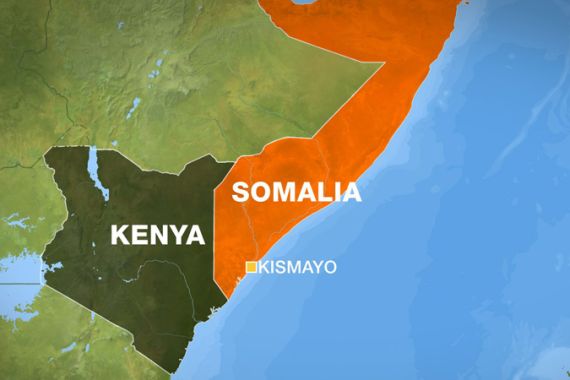Kenyan and Somali troops surround Kismayo
Forces advance on port city after Somalia’s rebel group al-Shabab, which has been in control, is forced to pull out.

Hundreds of Somali and Kenyan armed forces have surrounded the southern port city of Kismayo, a former rebel stronghold, Al Jazeera has learned.
The troops surrounded Kismayo on Monday but residents said earlier that some of the soldiers had entered the city.
“What happened earlier is that a group of 30 to 45 Somali government troops went into the town, had a meal at a few open restaurants and left the town,” Al Jazeera’s Mohamed Adow reported from the Kenyan capital Nairobi.
“Somali government forces and the African Union peace keeping mission, which the Kenyan forces are fighting under, have surrounded Kismayo and have not gone in.”
Mohamud Farah, the spokesperson for Somali forces in the southern Juba area, said: “We have sent 450 [troops] to patrol the town and settle in the police headquarters.”
Witnesses said the forces were taking up positions in the city.
“They arrived from the west of the city and are taking up positions,” said Aden Ismail, a local trader.
‘Fed up with misrule’
Asha Mohamed Aden, a seller of second-hand clothing, said she had seen “heavily armed Kenyans” along with Somali officers.
“Some people are happy to welcome them because they were fed up with the misrule of the al-Shabab fighters,” another resident, Abdullahi Farey Hassan, told the AFP news agency.
“But I will have my reservations until I see them doing something good. I hope they will be better than al-Shabab.”
Al-Shabab rebels had earlier vacated Somalia’s second largest city after a surprise assault by sea, air and ground forces from the Kenyan and Somali military that began on Friday.
Commanders for the group told Al Jazeera that their forces withdrew in order to avoid conflict in the streets, but said that their group had not abandoned the town, and would continue fighting for it.
Al-shabab said its fighters were poised to engage the allied troops once they entered the city centre, threatening to turn the streets into a “battlefield”.
Members of the African Union Mission in Somalia (AMISOM), which totals 17,000 soldiers across the country, had been cautious about pouring into the port city from its outskirts.
Farah, the Somali military spokesperson, said earlier that AU forces were wary of the threat of landmines laid by the rebels.
“Every step in Kismayo is sandy. We anticipate mines have been planted,” he said.
On Saturday, Hussein Arab Isse, Somalia’s deputy prime minister and defence minister, told Al Jazeera that AU forces had been waiting for peace negotiations with local tribal elders to end before entering the city.
‘Major blow’
In the past four weeks, fearing an assault by the Kenyans, an estimated 12,000 people have fled the city, whose total population is estimated at between 160,000 and 190,000.
Hassan Sheikh Mohamud, the newly elected Somali president, praised the AU peacekeeping force on Monday for forcing al-Shabab to vacate the city.
“We commend AMISOM and the Somali troops who have shown bravery by forcing the enemy out of the town,” a statement from the president’s office said.
 |
| Loss of Kismayo a day after it was attacked by AU forces will deal blow to al-Qaeda-linked rebels [EPA] |
“This is a major blow to them and we think it’s positive for the region and for Somalia,” said Musalia Mudavadi, the deputy Kenyan prime minister.
The loss of Kismayo is a major blow to the al-Qaeda-linked rebels, weakening morale and depriving them of revenue from taxing local businesses and shipping.
Al Jazeera’s Adow described Kismayo as a very important and strategic town for the group.
Kismayo “is the backbone of the funding of al-Shabab”; it is also the location from which the group bring in their arms and supplies, he said.
Losing the city, said Adow, would be “a huge setback for” the group and would leave them with the Somali capital as the only place that can provide al-Shabab with a hideout where they will also have access to “soft targets”.